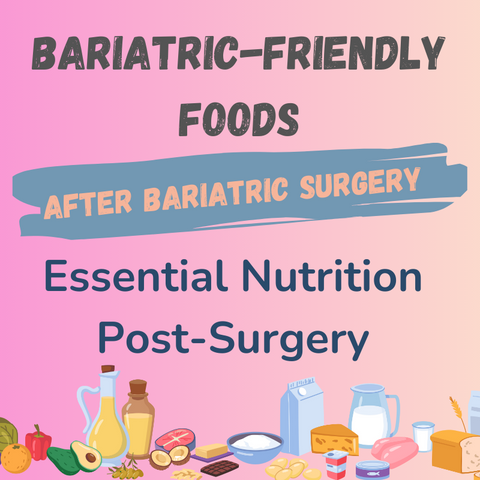Your cart is empty
Bariatric-Friendly Foods: Essential Nutrition Post-Surgery

Bariatric foods are specially designed or prepared to meet the dietary needs of individuals who have undergone bariatric surgery procedures such as gastric bypass or gastric sleeve surgery. Following surgery, patients have much smaller stomach capacities so they must focus on eating smaller portions of foods that are softened, nutrient-dense, and high in protein. Bariatric foods help patients meet their nutritional needs while promoting weight loss.
Types of Bariatric Foods
There are a variety of bariatric food products available, including:
-
Protein shakes: Liquid protein supplements are essential to help bariatric patients meet their high protein needs. Pre-made shakes are convenient options.
-
Pureed foods: Fruits, vegetables, and other foods can be pureed into a smooth, creamy texture that is easier to digest.
-
Soups: Broth-based soups with very soft vegetables or beans are good bariatric options.
-
Soft solid foods: Soft, moist foods that can be easily chewed and swallowed are recommended after surgery. Examples include soft scrambled eggs, cottage cheese, refried beans, and moist fish fillets.

Benefits of Bariatric Foods
Consuming bariatric-friendly foods provides many benefits:
-
Improved digestion and reduced dumping syndrome: Bariatric foods are easier to break down and digest than heavy, dense foods. This helps avoid discomfort, nausea, and vomiting.
-
Better nutritional status: Bariatric foods allow patients to meet their protein and vitamin needs for healing and weight maintenance.
-
Aids weight loss: High protein, low fat, low sugar bariatric foods promote safe weight loss after surgery. Small portions also help keep calorie intake controlled.
Choosing Bariatric Foods
Follow these tips for choosing optimal bariatric foods:
-
Seek out high protein options to meet the 60-80g daily protein goal.
-
Choose foods with less than 5g of sugar per serving to avoid dumping syndrome.
-
Look for low fat options since fat slows digestion.
-
Check that foods can be mashed with a fork or are naturally soft in texture.
-
Read nutrition labels closely and consult a dietitian if needed.
-
Consider taking bariatric vitamins as recommended by your doctor to prevent nutritional deficiencies.
Bariatric Food Recipes
Try making these delicious bariatric-friendly recipes at home:
-
High protein oatmeal made with milk and Greek yogurt
-
Veggie egg muffins with soft vegetables baked in egg cups
-
Yogurt parfaits layered with Greek yogurt, fresh berries, and ground nuts/seeds
-
Protein smoothies made with protein powder, milk, soft fruits, and nut butter
-
Soft cooked vegetables like well-cooked carrots, green beans, and winter squash
Conclusion
Following bariatric surgery, modifying the diet with bariatric foods helps ensure patients get proper nutrition for health and weight loss. Bariatric foods are now widely available in stores and online shops. With some simple recipe ideas, patients can also prepare satisfying bariatric meals at home. Focus on high protein, vitamin-rich foods that are soft and easy to digest as the staples in your bariatric diet.
Writer: Allison Allison, a certified nutritionist and research author, brings over 15 years of experience in the health and weight loss industry. Allison's influence extends through her authorship of multiple health and wellness journals, where she shares her expertise and research on medical weight loss and bariatric medicine. |
Reviewed By: Dr. K. Huffman Dr. Kevin D. Huffman, D.O., is a board-certified bariatric physician renowned for his expertise in treating obesity. With over 10,000 patients and a reputation as a national leader in bariatric medicine, he has trained hundreds of healthcare providers. As the founder of American Bariatric Consultants, Dr. Huffman develops protocols and training materials sought after by medical societies, pharmaceutical companies, patients, and hospitals. |
Bariatric Guides & Information
More Info
- Choosing a selection results in a full page refresh.


















